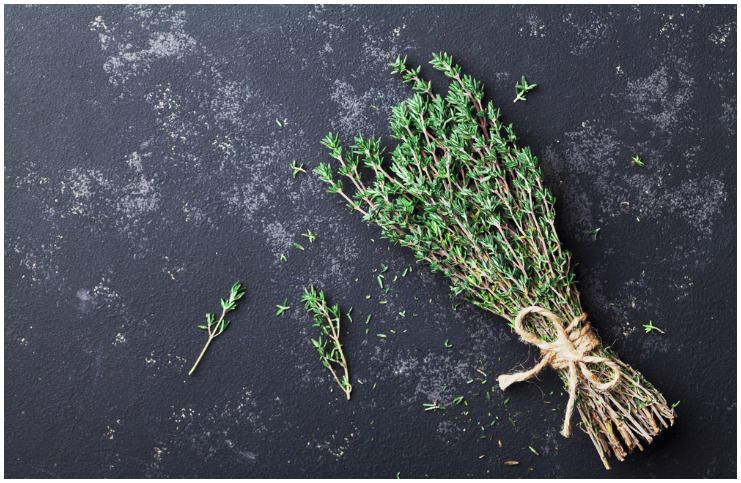Rosemary (scientific name – Rosmarinus officinalis) is a fragrant evergreen herb native to the Mediterranean and along with many other herbs, like – basil, oregano, and lavender, it is a member of the mint family Lamiaceae.
It is considered one of the most powerful essential oils and herbs on the planet. It is usually available as a dried whole herb, fresh herb, essential oil, and dried in capsules.
Nutrition Facts
It is a good source of protein, dietary fiber, vitamin C, vitamin A (in the form of carotenoids), selenium, calcium, niacin, riboflavin, zinc, phosphorus, folate, vitamin B6, iron, magnesium, manganese, thiamin, and potassium.
This herb also contains antioxidant and antibacterial rosmarinic acid, plus a few essential oils which are known to have anti-fungal, anti-inflammatory, and antiseptic properties, like – camphene, cineol, bornyl acetate, borneol, and α-pinene.
Health Benefits
Alzheimer’s Disease
It is a chronic neurodegenerative disease that typically worsens over time and starts slowly but it’s serious enough to interfere with daily life. Furthermore, it is the most frequent type of dementia.
This herb has been strongly associated with stimulating cognitive activity in people suffering from acute cognitive disorders, like – dementia or Alzheimer’s as well as in the elderly.
Liver
The liver, located on the upper right side of the human body, is the largest organ in the body. Recent research established that regular supplementation with this remarkable herb considerably stimulates the body’s bile flow, an important mechanism for detoxification and fat metabolism, plus, it reduces plasma liver enzymes.
Cancer Prevention
About 1,658,370 new cancer cases were diagnosed in 2015 in the United States. There are more than 100 types of cancer, including skin cancer, breast cancer, lung cancer, prostate cancer, colon cancer, and lymphoma. The good news is that an essential oil produced from this herb slowed the spread of breast carcinoma cells, according to research issued in Oncology Reports.
Stress
Anxiety is a general term for a few disorders which cause fear, nervousness, worrying, and apprehension. This mental problem affects approximately 19% of American adults, which is more than 40 million people age 18 or more.
According to a study conducted at the University of Maryland Medical Center, the combination of essential oil made from this herb with other essential oils may lower cortisol levels, therefore, reducing anxiety levels.
Side Effects
This herb has no side effects, but, overconsumption may cause vomiting and pulmonary edema (fluid accumulation in the air spaces of the lungs) in sensitive individuals.
Thyme
This perennial herb is a member of the mint family. It is commonly used in cooking, aromatherapy, mouthwashes, potpourri, elixirs, and some ointments.
The name of this herb is derived from the Latin word ”thymus,” which goes back to the Greek word ”thymós,” originally translating as “smoke.”
Egyptians used it as one of the herbs in the mummification and embalming process. Also, people in ancient Rome added this amazing herb to alcoholic beverages as well as to treat melancholy.
Nutrition Facts
It is rich in vitamin C, copper, vitamin A (in the form of carotenoids), iron, selenium, zinc, potassium, calcium, vitamin B2, manganese, vitamin B6, dietary fiber, protein, phosphorus, and vitamin B9. The principal component is thymol, which gives potent antiseptic properties as well as geraniol, carvacrol, and borneol volatile oils.
Health Benefits
Breast Cancer
There are more than 3 million breast cancer survivors in the US. Also, over 250,000 new cases of breast cancer will be diagnosed per year in women in 2017 and it is the most frequent invasive cancer in women. This herb contains one of the most potent antioxidants known today, which has been proven in studies to kill 98 percent of breast cancer cells.
Immunity
White blood cells, also referred to as leukocytes, are an essential part of the immune system. They help fight infections by attacking viruses, bacteria, and germs which invade the human body. A substance in this herb acts as a white blood cell stimulant, as per a study published in the 2014 issue of The International Immunopharmacology Journal.
Respiratory Problems
Bronchitis is an inflammation of the tubes which transport air to the lungs. Acute bronchitis lasts less about 10 days, however, some symptoms can last for up to a month.
Using this herb combined with ivy syrup can help treat this type of respiratory problem, according to a study conducted on 1234 children with acute bronchitis.
Side Effects
This spice has no side effects, with the exception that it should be avoided if you suffer from epilepsy or hypertension and if you are pregnant or breastfeeding a baby.
Rosemary vs Thyme – Which Has A Better Nutritional Profile?
Both these amazing herbs are members of the mint family and, in a ground and crushed form, these herbs tend to look very similar.
Regarding nutrition, these spices have a similar nutritional profile and should be included in your regular diet.
Images credit – Shutterstock
READ THIS NEXT: Rambutan vs Lychee – Which Has A Better Nutritional Profile?
